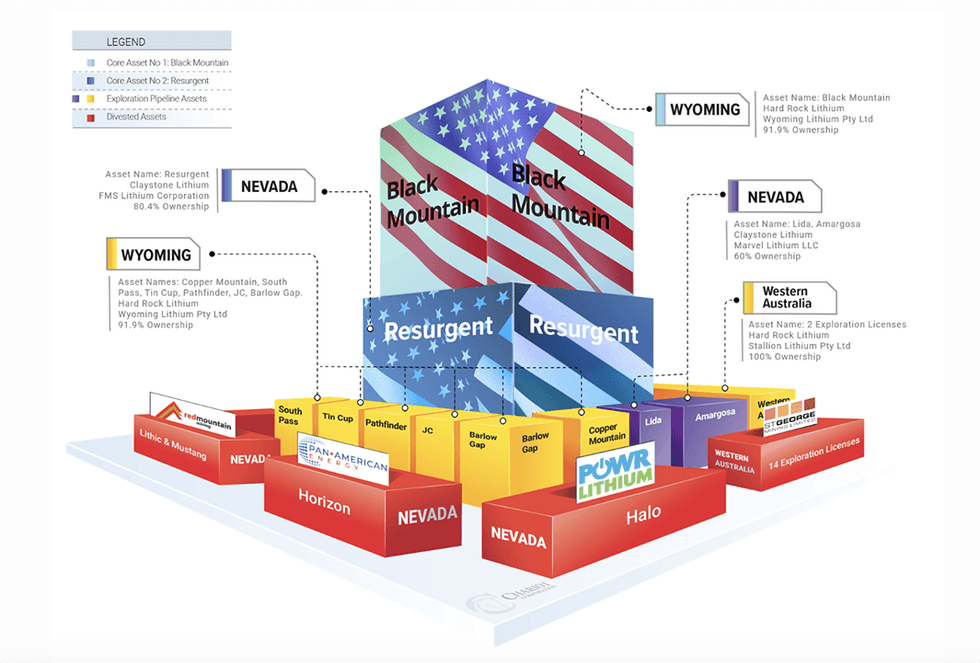Overview
Chariot Corporation (ASX:CC9) is the largest land holder for lithium exploration in the US. It has a strategy to target both hard rock lithium in Wyoming and claystone lithium in Nevada and Oregon. The flagship Black Mountain Project, located in Wyoming, has shown significant mineralization with grades of up to 6.68 percent Li2O from rock chip samples. In addition to the Black Mountain Project, Chariot holds six other hard rock projects in Wyoming with 443 claims covering 3,585 hectares.
Chariot’s second flagship project, Resurgent, holds the second largest land position in the McDermitt Caldera, which hosts the two largest lithium resources discovered to date (Thacker Pass 19.1 million tons (Mt) lithium carbonate equivalent (LCE) and McDermitt 21.5 Mt LCE). The recent $650-million investment in Thacker Pass by General Motors indicates interest from automakers looking to secure a supply of battery raw materials. The McDermitt Caldera’s size and scale potential present an opportunity for Automotive OEMs, battery manufacturers and others to obtain large-scale supply to meet their growth plans.
The automaker’s EV targets and government policies banning new internal combustion engine (ICE) car sales could propel lithium demand to 3.7 Mt by 2030, according to projections from mining giant Albemarle. This implies a CAGR of more than 20 percent between 2022 and 2030. As the world’s demand for lithium continues to grow, Chariot’s exploration and development efforts in the US are well-timed and offer investors exposure to the rapidly growing lithium market.
In addition to exploration-led initiatives, Chariot has been actively focusing on creating value through the divestment of selected lithium assets. Four such assets have been divested so far through sale and/or option agreements with publicly listed companies. These transactions, assuming the existing options are exercised, may generate up to an estimated US$5.1 million in cash and stock-based consideration, in addition to future royalty payments for Chariot. The company currently has four additional projects that may be potential divestment opportunities, including Lida and Amargosa (Nevada), Mardabilla (Western Australia) and Nyamukono (Zimbabwe).
The company believes its two core projects, Black Mountain and Resurgent, represent early, prospective lithium opportunities in the United States. Chariot has received and completed the necessary approvals and preparations for drilling and has now commenced the phase 1 diamond drill program at the Black Mountain Project. This program was developed following highly encouraging assay results from the 22 rock chip samples collected to date at Black Mountain, which returned assay results of up to 6.68 percent lithium oxide. Eight holes were drilled and the first three holes intersected high-grade spodumene mineralisation which confirmed potential of the Black Mountain LCT pegmatite swarms. Assay results for the subsequent five holes are pending and expected to be announced by April 2024. Chariot plans to conduct a phase 2 drilling program beginning in Q2 2024.
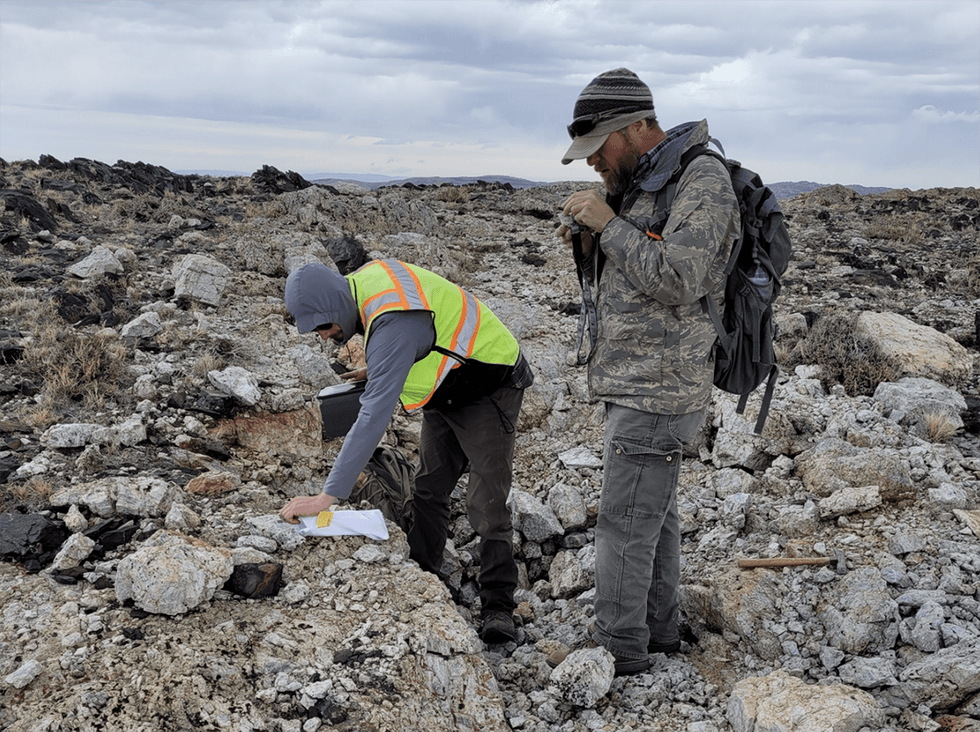
Following the AU$9-million IPO, Chariot now has nearly AU$11.2 million available cash, which is sufficient to fund its exploration activities for the next 24 months. Of the AU$11.2 million, nearly 43 percent or AU$4.8 million will be spent on the Black Mountain Project.
Concurrently, the company plans to continue early exploration activities at the Copper Mountain Project, South Pass, Wyoming Regional and the Resurgent Project to define targets for future drilling.
Chariot boasts a world-class team with strong track records in mining, exploration and the financial services sectors. The management has significant corporate and investment banking experience. Non-executive chairman Murray Bleach was formerly the CEO of Macquarie in North America, while the CEO, Shanthar Pathmanathan was an oil and has investment banker with Macquarie and Deutsche Bank. On the geological side, Neil Stuart who is a non-executive director is a lithium industry veteran having previously founded Orocobre Ltd (which later merged with Galaxy Resources) to form Allkem Ltd, one of the largest lithium producers in the world. The exploration team is led by Dr. Edward Max Baker, a geologist with over 40 years of experience and several discoveries. He was the chief geologist at Newcrest Mining, MIM Holdings, Rennison Goldfields and Mount Isa Mines. The collective experience of the management team, from investment banking (with fundraising and M&A experience) to resource discoveries, will be useful in advancing the company’s core projects.
Company Highlights
- Chariot Corporation Limited is a mineral exploration company focused on discovering and developing high-grade and near-surface lithium opportunities in the U.S.
- Chariot holds the largest land position for lithium exploration in the U.S. with hard rock lithium and claystone hosted lithium exploration assets.
- The company commenced trading on the ASX in October 2023 after closing a highly sought-after and oversubscribed A$9 million initial public offering (which is in addition to A$14.8 million being raised privately to assemble the portfolio).
- It is currently focused on its two core projects in the US: (1) the Black Mountain Project, a hard rock lithium project located in Wyoming; and (2) the Resurgent Project, a claystone lithium project located in Oregon and Nevada.
- The Black Mountain Project has had two-rounds of rock chip sampling which resulted in 22 rock chip samples collected with 10 of these samples returning assay results greater than 2.00% lithium oxide (Li2O) with the highest value being 6.68 percent Li2O. The Resurgent Project has had multiple rounds of rock-chip sampling with 289 samples being collected and returning values as high as 3,865 ppm lithium. The initial surface rock-chip sampling programs demonstrate the presence of lithium mineralization at surface.
- In addition to the core projects, Chariot holds an exploration pipeline of six projects in Wyoming including Copper Mountain, South Pass, Tin Cup, Barlow Gap, Pathfinder and JC projects. These projects are prospective for hard rock lithium.
- The company’s portfolio includes several additional projects prospective for hard rock (Western Australia and Zimbabwe) and claystone lithium (Nevada, USA).
- Chariot also holds interests in several projects that have been either sold or conditionally divested through option agreements to publicly listed companies. These include assets such as Halo, Horizon, Lithic & Mustang, and the Western Australia Lithium portfolio. Each of the divested projects are operated by a publicly listed counterparty and depending upon the particular transaction, the projects generate additional revenue for Chariot in the form of future payments and royalties.
- Chariot offers investors exposure to the nascent and rapidly growing U.S. lithium market.
Key Projects
Black Mountain Project, Wyoming
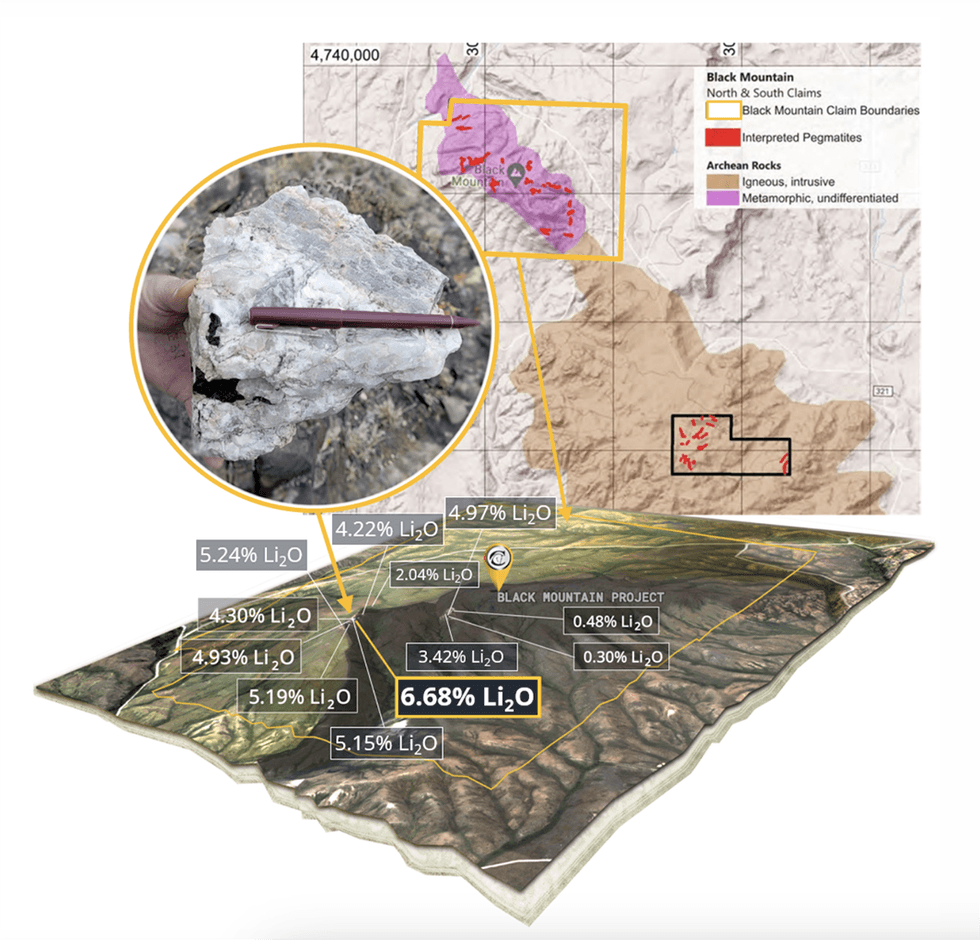
The Black Mountain Project is Chariot’s flagship hard rock lithium project located in Natrona County, approximately midway between Casper and Riverton, Wyoming. Chariot initially held a 91.9 percent stake in the project with 134 mining claims covering 878 hectares. In 2024, the company expanded the project with 218 contiguous claims resulting in a 206 percent increase in project tenure area. Black Mountain project now comprises 352 claims covering 2,686 hectares of tenure which subsequently increased Chariot’s ownership interests in its Wyoming lithium portfolio to 93.9 percent.
The project is well-serviced by existing roads and infrastructure and comprises . The claim area was acquired via claim staking of public land administered by the US Bureau of Land Management.
The project features large spodumene-bearing pegmatites outcropping at surface. Results from the rock chip sampling program returned a best result of 6.68 percent lithium oxide from a spodumene outcrop. In a recent exploration program, 22 rock chip samples returned assays with an average result of 2.16 percent lithium oxide.
The company is conducting a 3,000-metre phase 1 drilling program at Black Mountain, which commenced in November 2023. The site preparation, necessary approvals and the earthworks required to support the drilling program have been completed.
The phase 1 drill program is designed to test the portion of the Black Mountain pegmatite dyke swarm, a target area that is 1,000 metres long by 100 metres wide. More than 22 rock chip samples were taken from this area and the assay results were highly encouraging. Of the 22 rock chip samples, eight had assay results greater than 4 percent lithium oxide, with the highest value being 6.68 percent lithium oxide from a spodumene outcrop. Chariot announced that the first three holes from the drill program delivered strong initial hard rock lithium results with multiple mineralised lithium intersections.
Black Mountain may represent a significant hard rock lithium opportunity in a tier-1 mining jurisdiction in the US. The asset features an excellent combination of geological factors, and a supportive regulatory regime and is located in a largely unpopulated part of Wyoming.
Resurgent Project, Nevada and Oregon
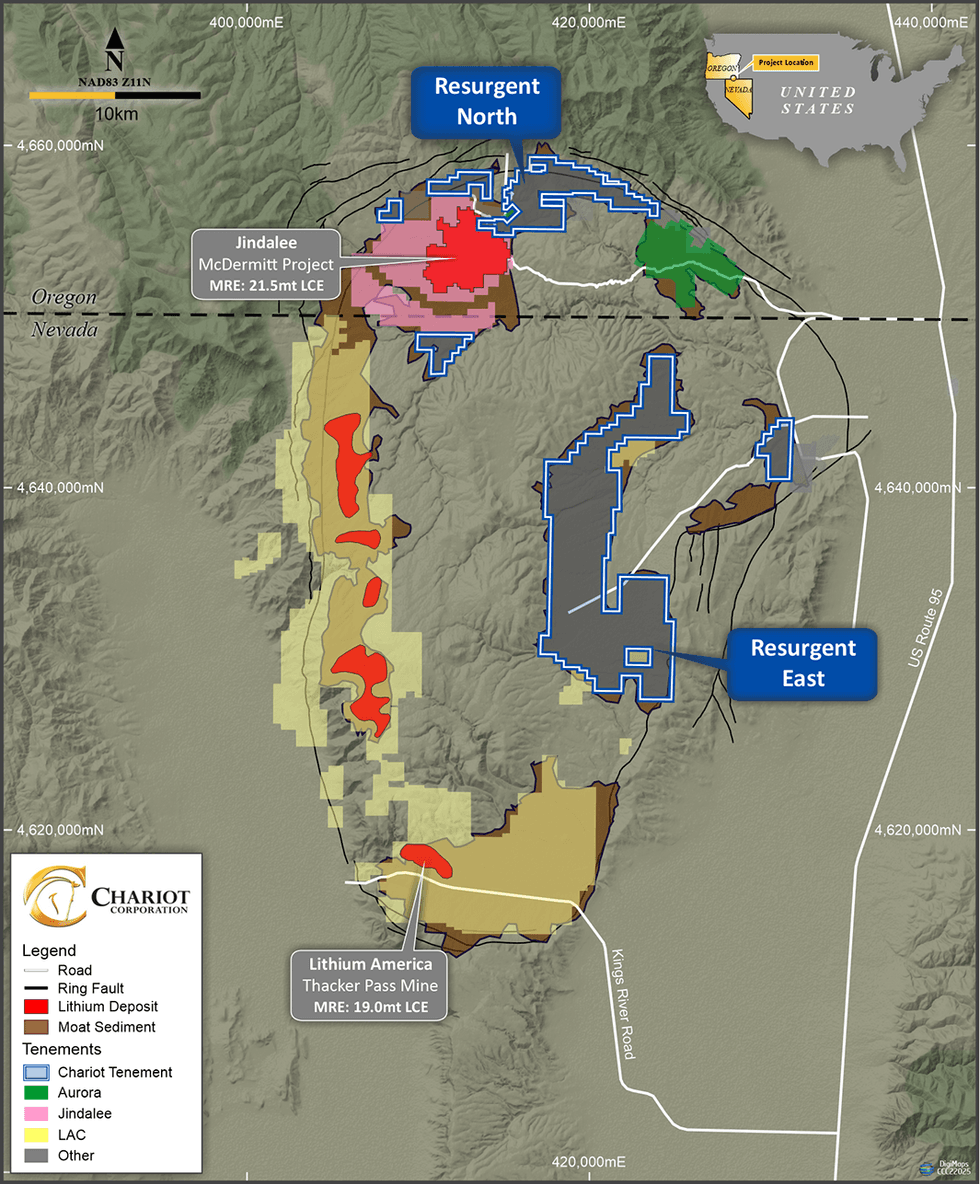
The Resurgent Project is a claystone-hosted lithium project located in the McDermitt Caldera in Oregon and Nevada. The company owns a 79.4 percent stake in this project. The Resurgent Project comprises 1,450 claims covering 12,128 hectares and is further subdivided into two principal claim areas, identified as ‘Resurgent North’ and ‘Resurgent East.’ Chariot has the second-largest land position in the McDermitt Caldera, which hosts two of the largest lithium mineral resources in North America, with a combined mineral resource estimate of over 40 Mt LCE – Thacker Pass at 19.1 Mt LCE and McDermitt at 21.5 Mt LCE.
The Resurgent North project targets the same sedimentary units that host Jindalee Resources’ (ASX:JRL) McDermitt project with a mineral resource estimate of 21.5 Mt LCE. A surface sampling campaign at Resurgent North conducted in 2021 involving 289 samples returned values as high as 3,865 ppm lithium (over three times typical lithium claystone MRE cut-off grade). Of the 289 samples, 70 samples returned values greater than 100 ppm lithium, 20 samples returned values greater than 1,000 ppm lithium and 10 samples returned values greater than 2,000 ppm lithium.
The Resurgent East project targets the same sedimentary units that host Lithium Americas’ (NYSE:LAC) Thacker Pass lithium deposit (MRE at 19.1 Mt LCE). The similarity in geological characteristics with the two largest lithium deposits in the US further validates the potential for a large-scale high-grade lithium discovery at Resurgent.
Exploration Pipeline Projects
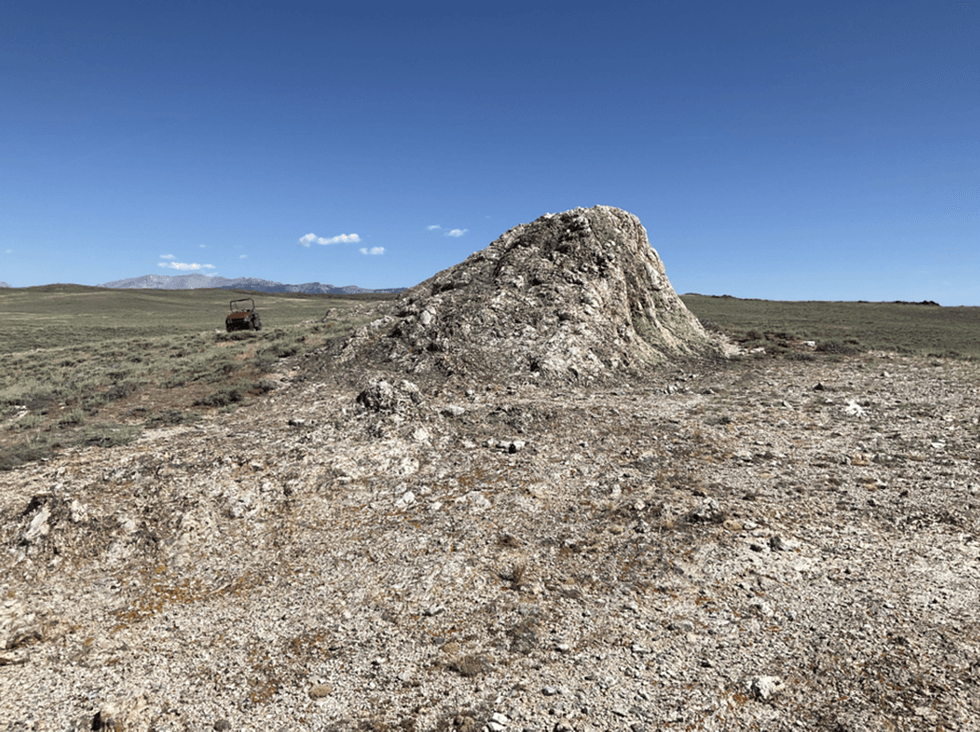
Besides the two core projects, the company has a pipeline of six lithium exploration projects comprising 443 claims and covering 3,585 hectares. Each of them is described below:
- Copper Mountain Project: The project is located ~80 kilometres northwest of Black Mountain in Fremont County, Wyoming. It comprises 83 mining claims covering 648 hectares. Copper Mountain has a long history of prospecting and artisanal-scale production having been historically mined for mica, feldspar, beryl, lepidolite and tantalite. The company has already identified multiple pegmatite target areas and has plans for a geochemical and ground magnetics survey in addition to geological mapping.
- South Pass Project: The project is located in Fremont County, Wyoming, and comprises 214 mining claims covering 1,750 hectares. This is a large and highly prospective project with an abundance of outcropping pegmatites that occur in swarms. The company notes the individual pegmatites at the project could range up to several hundred metres wide and several thousand metres long. There has been no prior exploration for hard rock lithium in the South Pass project area.
- Regional Wyoming Exploration Pipeline Projects: It comprises four hard rock lithium mining projects namely Tin Cup, Pathfinder, Barlow Gap and JC, comprising 146 mining claims covering 1,146 hectares.
- Barlow Gap Project: This project is located in Natrona County, Wyoming, and comprises 60 mining claims covering 501 hectares. This is an early-stage hard rock lithium exploration project with outcropping pegmatites on a northeast trend.
- Tin Cup Project: The project is located in Fremont County, Wyoming, and comprises 45 mining claims covering 376 hectares. There is a long history of exploration at The Tin Cup mining district dating back to 1907. The region has been known for small-scale mining for gold, copper and various gemstones including red jasper, ruby and jade. This is an early-stage hard rock lithium exploration project with outcropping pegmatites.
- Pathfinder Project: This is an early-stage hard rock lithium project located in Natrona County, and comprises 32 mining claims covering 234 hectares.
- JC Project: Located in Fremont County, Wyoming, the project comprises nine mining claim blocks spanning 75 hectares. This is an early-stage hard rock lithium exploration project that features several small excavation pits and outcropping pegmatite dykes.
Divestment Projects
In addition to exploration-led initiatives, Chariot has been actively focused on creating value via divestment of selected lithium assets in its portfolio. In total, four such assets – Halo (Chariot’s ownership 21.4 percent), Horizon (Chariot’s ownership 21.4 percent), Lithic & Mustang (ownership 21.4 percent) and WA Lithium portfolio (Chariot was the 100 percent owner of this property prior to the sale to St George Mining Ltd) – have been divested so far through option agreements to publicly listed companies. These transactions, if the options are exercised, may generate up to an estimated US$5.1 million in gross proceeds (cash and stock-based consideration) for Chariot in addition to future royalty payments.
a) Halo asset: Sold to POWR Lithium for a total consideration of ~US$2.5 million and 1 percent NSR.
b) Horizon asset: Sold to Pan American Energy for a total consideration of US$15 million.
c) Lithic and Mustang assets: Sold to Red Mountain Mining for a total consideration of ~US$1.7 million and 2 percent NSR.
d) WA Lithium portfolio: Sold to St George Mining for a total consideration of ~US$1.1 million and 2 percent NSR.
Moreover, the company has identified four more projects for divestment: Lida Project (Nevada), Amargosa Project (Nevada), Nyamukono Project (Zimbabwe), and Mardabilla Project (Western Australia).
Management Team
Murray Bleach – Non-executive Chairman
Murray Bleach has over 40 years of experience in investment banking, funds management and infrastructure. He previously held executive director and CEO roles at Macquarie Group’s North American business from 1999 to 2009, and was the CEO of Intoll Group Limited prior to its sale for AU$3.5 billion in 2010. He currently serves as the infrastructure and private equity expert at AustralianSuper for its direct investment group and transaction review committee. He also holds numerous chair and non-executive director roles at various funds, investment start-ups and not-for-profit ventures. Bleach holds a Bachelor of Arts (financial studies) and a master’s degree in applied finance from Macquarie University.
Shanthar Pathmanathan – Managing Director
Shanthar Pathmanathan has 14 years of investment banking experience in the metals and mining, oil and gas and chemicals sectors. Prior to Chariot, he was the CEO and managing director of Lithium Consolidated, an ASX-listed company, which had one of the largest portfolios of hard rock lithium exploration assets, globally. Before that, he held various investment roles with Deutsche Bank and Macquarie Group. He has a Bachelor of Laws from the University of Western Australia.
Frederick Forni – Executive Director
Frederick Forni is a senior finance professional with over 25 years of investment banking experience. He was a former senior managing director of Macquarie Holdings (USA) and held non-executive director roles with numerous Macquarie Group entities and GLI Finance Ltd. He holds a B.A. in economics from Connecticut College, a J.D., awarded cum laude, from Georgetown University Law Center and an LL.M. in taxation from New York University Law School.
Neil Stuart – Non-executive Director
Neil Stuart is an exploration geologist with over 40 years’ of experience and is a member of The Australian Institute of Geoscientists and a Fellow of The Australasian Institute of Mining and Metallurgy. He was a founding director of Orocobre Limited, now Alkem (ASX: AKE). He has considerable experience across several commodities and was heavily involved in project delineation and acquisition in Australia, Mexico and Argentina. Over the last 20 years, he was involved with the exploration and commercial development of lithium projects. Stuart is on the board of numerous ASX-listed companies and is a graduate of the University of Melbourne (BSc.) and James Cook University (MSc.).
Dr. Edward Max Baker – Geological Consultant
Dr. Edward Max Baker is a Ph.D. geologist and a fellow of AusIMM. Baker has over 40 years of experience and has made several discoveries. Baker was chief geologist for Newcrest Mining, MIM Holdings, Rennison Goldfields and Mount Isa Mines. Baker was co-founder and previously a vice-president of exploration at New York Stock Exchange-listed Integra Resources (NYSE:ITRG).
Ramesh Chakrapani – Chief Strategy Officer
Ramesh Chakrapani has over 20 years of experience in the investment banking and alternative asset investing space. Of which, over 15 years were spent at The Blackstone Group where he was a managing director and a member of the Hedge Fund Solutions Special Situations Investing Group. Chakrapani has invested across a diverse set of industries, asset classes, geographies and liquidity profiles, and has represented The Blackstone Group on the boards of selected investments. He has a B.A. from Yale University.
This article was written in collaboration with Couloir Capital.
Credit: Source link



